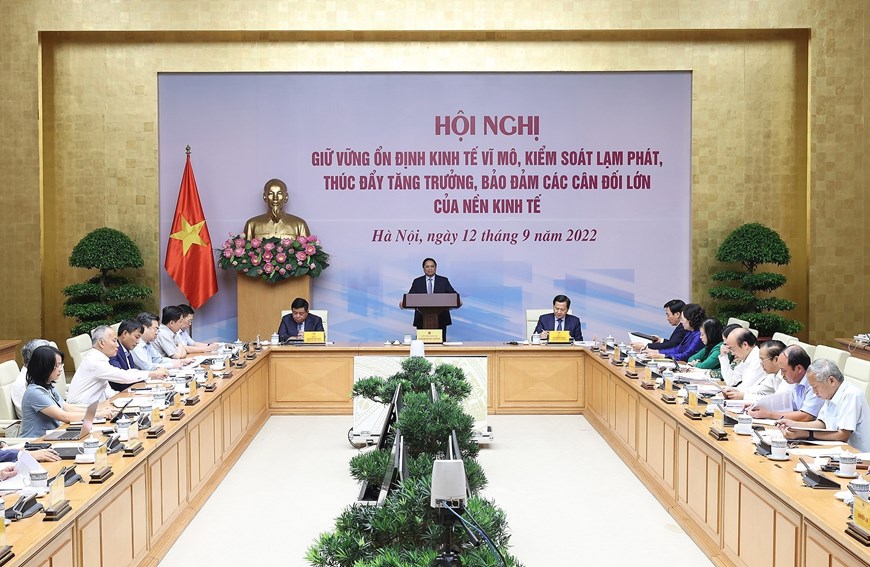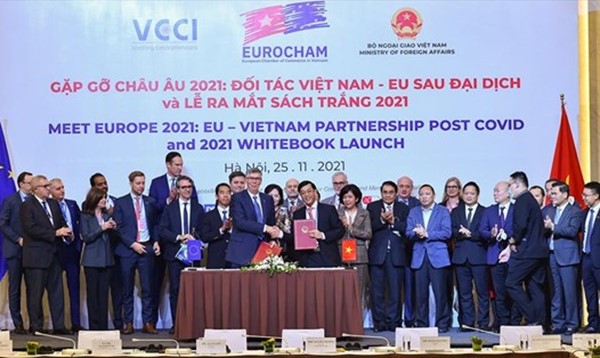Promoted by DSM Communications Belgium. The views belong to the sponsor.
After more than 30 years of cooperation, Vietnam - a development partner of the EU in the Indo-Pacific - is becoming a beacon in the region with the capacity to control inflation and maintain economic growth at a high level despite turbulent international affairs.
EU - Vietnam’s cooperation, especially in trade and sustainable development, has created favourable conditions for citizens to improve the quality of life. It has also promoted the dialogue in response to global challenges and crises.
The strong support of the EU will continue to be an important incentive to develop the bilateral relations further, with the EU as the leading partner for the Southeast Asian countries (ASEAN) and, more broadly, the Indo-Pacific region.
Determined to be a beacon for economic and social development in the region
Although a potential global recession is looming worldwide, international financial institutions have come out with strong forecasts for Vietnam’s economy. The recent World Bank report published in August, forecast that Vietnam's GDP growth would increase considerably from 2.6% in 2021 to 7.5% in 2022, while keeping inflation stable at 3.8%. The International Monetary Fund forecasts a GDP growth of 6.7% in 2023, significantly above the regional and global average.
Most recently, credit rating agency Moody's upgraded Vietnam's rating from Ba3 to Ba2, with a stable outlook. Nikkei (Japan's Nikkei 225 Stock Average) assessed that Vietnam's COVID-19 recovery index ranked second in the world, up 12 places.
According to international economic analysts, Vietnam's outstanding results were due to the Government's flexible management policies such as low-interest rate support, credit growth maintenance, and the Socio-economic Recovery and Development Program. The converging point of these policies is the combination of market factors, state management tools, and the close supervision by Vietnam’s National Assembly, as well as the positive response of the Vietnamese government to feedback and comments from employees and the business community, including EU businesses.
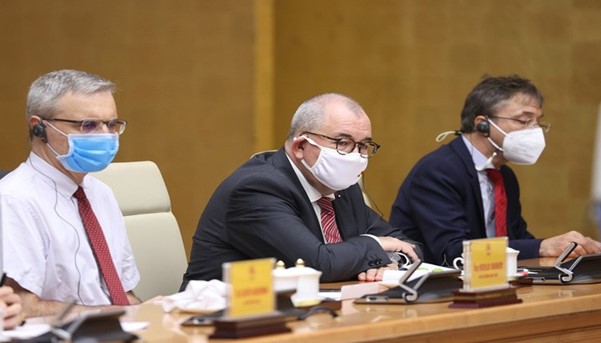
Vietnam's Prime Minister in a working session with Ambassador, Head of Delegation of the European Union (EU), EU member states Ambassadors, business associations, and several EU corporations in Vietnam to support and remove barriers for the business circle during the COVID-19 pandemic, on September 9th, 2021, at the Headquarter of the Government of Vietnam.
In addition, Vietnam’s early implementation of the Strategy of Living and Working during the COVID-19 pandemic and the acceleration of COVID-19 vaccine coverage have restored socio-economic activities at home and abroad as well as stabilized workers’ income and citizens’ livelihood.
Recently, Vietnamese students had their first in-person school year opening after two years of the pandemic. The service sector, especially in tourism and spa, has been restored to the pre-pandemic level. The tourist sector had to operate at high capacity in the past summer to meet the demand of domestic and foreign tourists. The atmosphere of excitement and optimism appears to have created a new development impetus for the country.

Vietnamese students started the new school year on September 5th, 2022.
However, difficulties remain. Vietnam is a member of 15 Free Trade Agreements and participates in many international organisations. Having a highly open economy, Vietnam is being directly affected by global affairs such as the risk of inflation, economic recession, supply chain crisis, scarcity of goods and food, fluctuations in energy prices, and regional conflicts.
To this can be added environmental problems, such as negative impacts of climate change, especially in the lower Mekong region.
The National Center for Hydro-Meteorological Forecasting forecast showed that the water level of stations on the Mekong River would gradually decrease and be at a below-average level. To minimize the negative impacts of salinization on human livelihoods in the Mekong Delta, local authorities have promptly built and put into operation huge irrigation works.
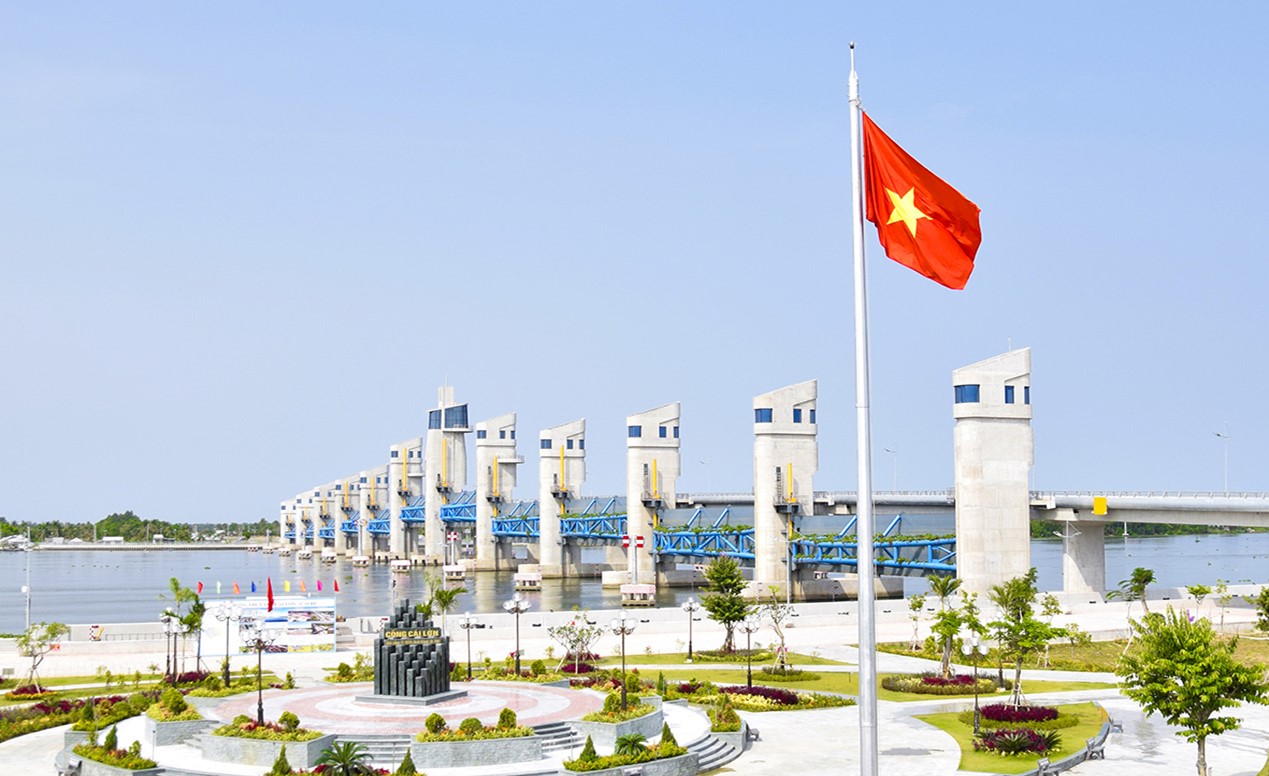
An irrigation project in Kien Giang province (Mekong Delta region) was inaugurated in March 2022 to create more stable and secure production conditions for farmers against the impacts of climate change.
EU and Vietnam's development steps
EU - Vietnam relations have been continuously strengthened during more than 30 years and become a model for regional and international cooperation and development partnership. The EU is one of Vietnam's leading trade and investment partners.
Following the implementation of the Vietnam - EU Free Trade Agreement (EVFTA) in 2019, bilateral trade has markedly increased between both sides. Total turnover in 2021 reached 57 billion USD, an increase of 14.5% compared to 2020.
In the first six months of 2022, it reached 31.7 billion USD, up 14.6% over the same period last year. Thanks to the agreement, Vietnamese citizens can access high-quality goods from the EU at more reasonable prices. Vietnamese goods and products are constantly improved and enhanced to meet the EU's regulations and standards.
Meanwhile, the commitments in the EVFTA, especially on Trade and Sustainable Development, are contributing to changing the production and business culture of Vietnamese enterprises in ensuring the quality of life, human rights and benefits of workers towards high standards in the EU's new generation of free trade agreement.
Vietnam's Domestic Advisory Group (DAG) was established and swiftly consolidated its organisation, expanding the number of members. Currently, DAG Vietnam has gathered a full range of research organisations and industry associations that employ many workers in the country. Additionally, DAG Vietnam also has members who are NGOs in the field of nature and environment protection.
Contributions from DAG groups are expected to bring Vietnam - EU trade cooperation on the right track, ensuring the legitimate interests of the people and businesses of both sides, as well as contributing to the overall development of the world.
Vietnam aims at creating a favourable investment environment for international businesses and corporations. According to data from the Asian Development Bank (ADB), infrastructure investment in both Vietnam's public and private branches reached approximately 5.7% of GDP in recent years, the highest in Southeast Asia and ranked second in Asia after China.
Recently, the Government of Vietnam planned to use 50% of the budget of the Project of Economic Recovery post-COVID-19 for transport infrastructure development (over 40,000 billion VND equivalent to 1.8 billion USD), prioritising the fastest expansion of the North-South expressway network to connect seaports and airports with industrial and logistic centres across the country. The North-South high-speed railway project is also being planned for construction.
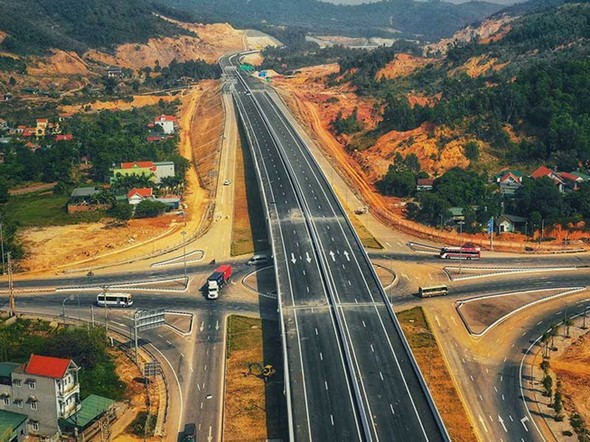
A section of the North-South highway through hardship mountainous areas of Vietnam.
The scale and speed of implementation of the infrastructure projects have created new development spaces for hardship rural and mountainous areas in Vietnam. They will facilitate the circulation of agricultural products, improve farmers' livelihoods, and attract business investment in factories, production and process industrial parks, creating new employment. The image of Vietnam's agriculture and rural areas is gradually reforming.
Increasingly, European companies see Vietnam as a promising business investment centre with many quality and sustainable projects. Recent investment statistics show the upward trend in investment from some EU countries into Vietnam, such as the Netherlands (+ 26%), Denmark (+ 240%), Sweden (+ 63%), the Republic of Ireland (+ 235 %), and Belgium (+ 284%).
The EU's financial investment focuses on high-tech companies and tends to expand into services such as post, finance, clean-tech sectors, high-tech agriculture, food manufacturing, and pharmaceuticals. According to the assessment of the Eurocharm office in Vietnam, the Business Climate Index (BCI) in the second quarter of 2022 reached 68.8 points, 7.6 points higher than in the fourth quarter of 2021. Many indicators improved, such as business owners’ satisfaction with Vietnam's efforts to attract and maintain foreign direct investment (FDI). 76% of the respondents expect their companies to increase FDI into Vietnam before the end of the third quarter.
Ensuring fairness and harmonisation of interests for businesses and improving income and the quality of life for hundreds of thousands of workers in factories and export processing zones of European enterprises in Vietnam will continue to be the yardstick of the EU's commitments as a cooperative business partner.
At the conference “Overcoming challenges, grasping opportunities, development cooperation” chaired by Prime Minister Pham Minh Chinh on September 17, Eurocham assesses that geopolitical conflicts as well as changes in policies of neighboring countries are opportunities for Vietnam to make a breakthrough. Vietnam needs to open up more strongly, more aggressively, to impress high-quality investors and secure a higher position in the global supply chain. European investors have been and will continue to commit to work with Vietnam to achieve this goal.
Strong commitment to corporate social and international responsibility
Along with efforts to improve the quality of the economic environment, Vietnam is constantly improving its commitments to sustainable trade. To date, Vietnam has acceded to 25 International Labor Organization (ILO) Labor Conventions, including 7/8 of the basic Conventions (Collective Bargaining, Prevention of Labor Discrimination, Child and Forced Labor).
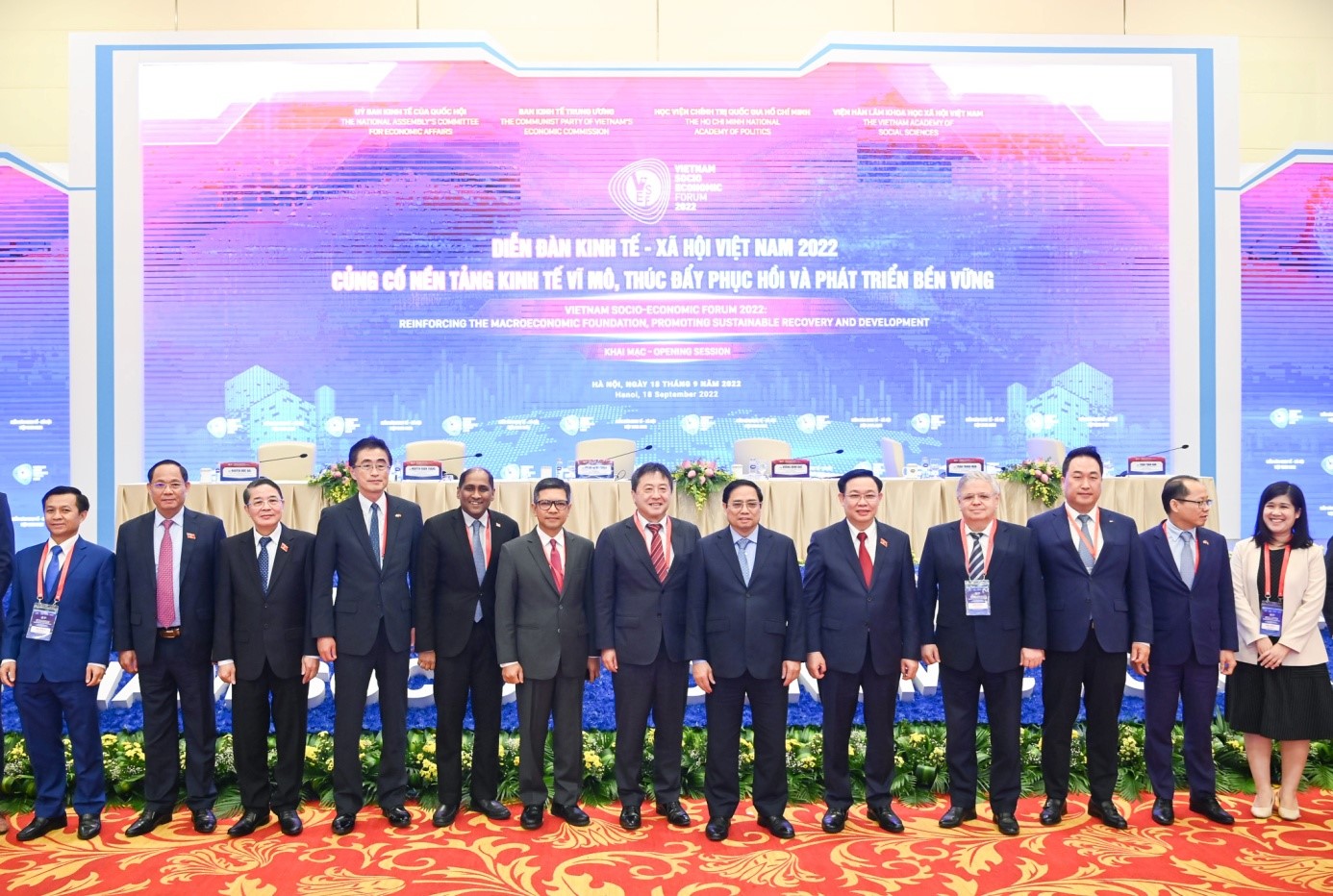
Vietnam Socio-Economic Forum 2022: “Reinforcing macro-economic foundation, promoting sustainable recovery and development.”
Notably, Vietnam is also one of the earliest countries to ratify two ILO instruments on Occupational Safety and Health, which are expected to be added to the group of basic Conventions. Vietnam's ratification of the accession to ILO Convention No. 105 on the abolition of forced labour and setting a roadmap for ratification of the Freedom of Association and Protection of the Right to Organise Convention (No. 87) in 2023 shows its seriousness and determination to implement the commitments to the EU.
At the UN climate change conference (COP26) in Glasgow last year, Vietnam and the EU jointly initiated and made the highest commitments to environmental protection. This pledge shows the common ground of the Vietnamese government and the EU when facing the challenges to mankind and the planet and establishing Vietnam as a reliable partner of the Union in international and regional forums. Recently, Vietnam has also become a leading partner in the Energy Transition Partnership (JETP) of the G7 in Southeast Asia.
Upgrading EU-Vietnam relations for bilateral and international benefits
Vietnam and the EU share many objectives, goals, and visions in maintaining multilateralism, promoting environmental protection, green and sustainable development, innovation and digital transformation. Promoting bilateral cooperation in diverse fields will support Vietnam in fulfilling its strategic and conditional goals to improve human livelihood, contributing to humanity's progress and the world's development.
In particular, after its successful contribution as a Member of the United Nations Security Council during the 2020-2021 term, Vietnam has now received the trust and support of many partners, expecting Vietnam to ensure and successfully implement its member role in the United Nations Human Rights Council (UNHRC) for the term of 2023 - 2025.
Despite many difficulties and challenges, Vietnam is willing to cooperate with other member states to uphold the rules of the UN Charter and international law and increase the effectiveness of the UNHRC through dialogue, cooperation and mutual respect. Vietnam will promote gender equality, especially for women and girls in the digital transformation era; continue to propose decisions on human rights and climate change with the members of the core group; and contribute to the UNHRC's efforts in the area of health rights. The co-operation with and support of the EU in general and EU member states in particular is expected and highly appreciated.

